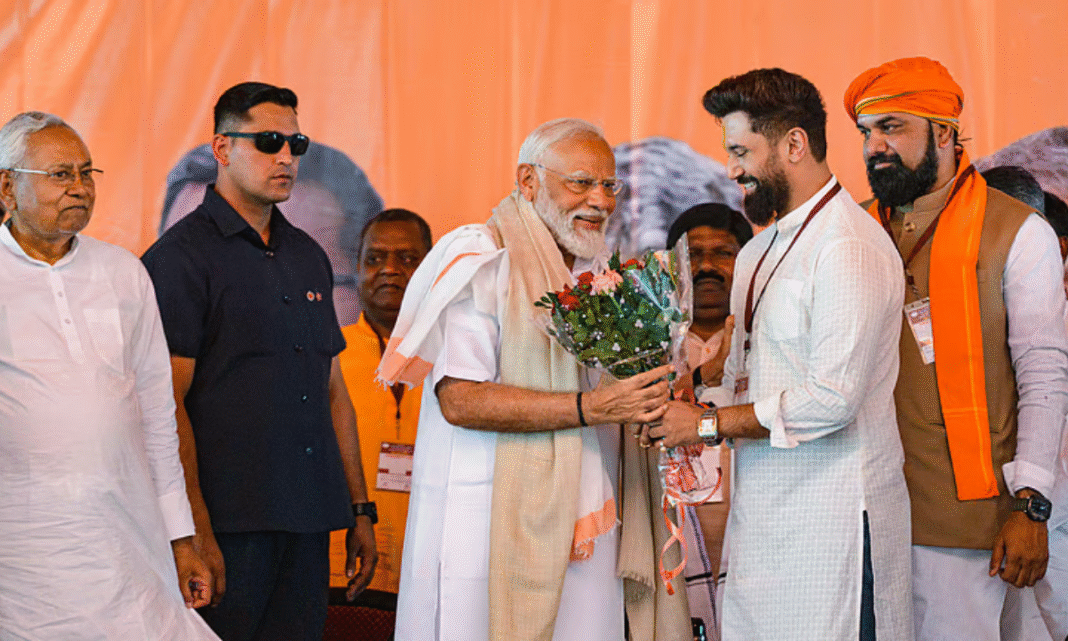The ruling National Democratic Alliance (NDA) has finally put an end to days of speculation by announcing its seat-sharing formula for the upcoming Bihar Assembly elections. The deal, finalised after intense rounds of discussion in both Delhi and Patna, reflects a carefully balanced power structure among key allies.
Equal Share for BJP and JD(U)
According to the agreement, both the Bharatiya Janata Party (BJP) and Janata Dal (United) will contest 101 seats each out of the 243 Assembly constituencies in Bihar. The equal distribution of seats between the two major partners demonstrates the NDA’s effort to maintain harmony and coordination in the alliance. Political observers believe this parity signals a strategic understanding between the two parties, ensuring that neither dominates the other in the state’s political landscape.
Chirag Paswan’s LJP(RV) Gets 29 Seats
Union Minister Chirag Paswan’s Lok Janshakti Party (Ram Vilas) has been allotted 29 seats under the new arrangement. Initially, Paswan had demanded 40 seats, citing his party’s growing influence among Dalit voters and young supporters. However, after several rounds of negotiation with senior BJP leaders, he agreed to the reduced number. Sources close to the discussions revealed that Paswan’s final decision was aimed at preserving alliance unity ahead of the high-stakes election.
Smaller Allies Get Six Seats Each
Apart from the BJP, JD(U), and LJP, two other allies — Jitan Ram Manjhi’s Hindustani Awam Morcha (HAM) and Upendra Kushwaha’s Rashtriya Lok Morcha (RLM) — will contest six seats each. Both parties play a significant role in influencing regional and caste-based vote banks in parts of Bihar. Including them in the alliance structure reflects the NDA’s attempt to present a united and inclusive front against the opposition bloc led by the Rashtriya Janata Dal (RJD).
Announcement by Dharmendra Pradhan
The formal announcement was made by Union Minister and BJP’s Bihar election in-charge Dharmendra Pradhan on Sunday. He shared the details of the seat-sharing arrangement on social media, confirming the alliance’s readiness to begin its campaign in full swing. Pradhan’s post marked the culmination of weeks of intense political discussions involving BJP national general secretary Vinod Tawde, Union Minister Nityanand Rai, and representatives of JD(U), LJP, HAM, and RLM.
Strategic Importance of the Deal
This seat-sharing formula holds strategic importance for the NDA, which seeks to retain power in Bihar. With both BJP and JD(U) contesting an equal number of seats, the alliance aims to project an image of unity and equality between Prime Minister Narendra Modi’s national leadership and Chief Minister Nitish Kumar’s state leadership. The inclusion of smaller parties like LJP(RV), HAM, and RLM ensures that no section of Bihar’s electorate feels ignored.
Political analysts point out that the deal also sends a strong message of stability within the NDA, especially after past tensions between the BJP and JD(U). By giving Chirag Paswan a respectable 29 seats, the alliance also hopes to prevent vote-splitting among Dalit communities, which form a significant share of the electorate.
Challenges Ahead
However, challenges remain. The NDA will have to ensure smooth coordination among its allies during seat allocation and candidate selection. There are concerns that dissatisfaction among local leaders could lead to rebel candidates or internal divisions. Additionally, the opposition alliance, led by Tejashwi Yadav’s RJD and supported by Congress and Left parties, is expected to mount a strong challenge, making the electoral battle more competitive.
A United Front for the Election
Despite these challenges, the NDA leadership appears confident that the new seat-sharing agreement will strengthen its position ahead of the polls. The deal reflects not only mathematical balance but also a political message of unity and collective purpose. With the announcement made, the alliance is now set to move into the next phase — campaign planning, candidate selection, and voter outreach.
As Bihar heads into one of the most closely watched state elections in recent years, all eyes will be on how this seat-sharing formula translates into on-ground performance. For now, the NDA’s message is clear — unity, discipline, and development will be their guiding principles in the race for Bihar.


